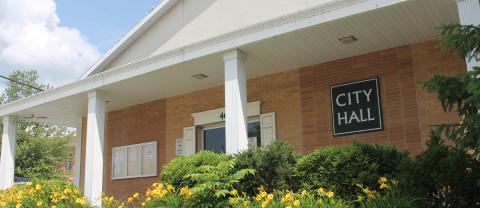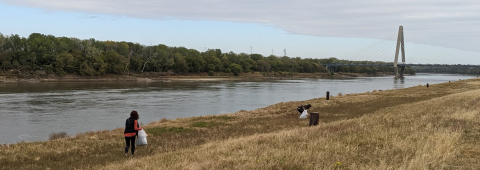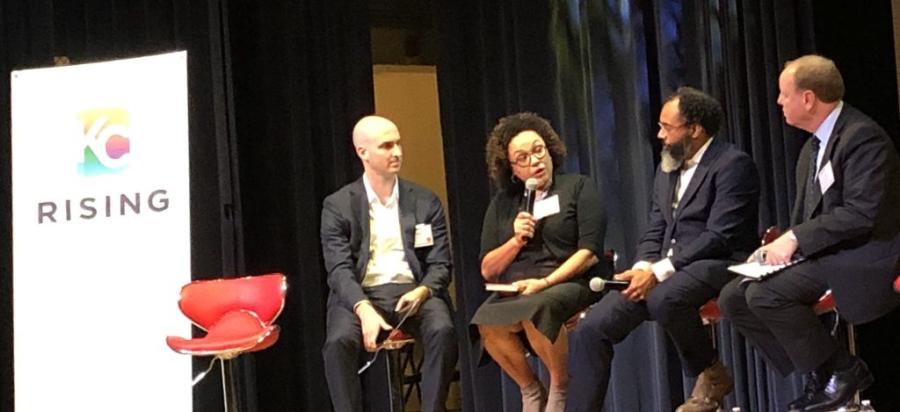Even in the most economically vibrant metropolitan areas in the country, not all residents are benefiting from economic growth. That’s the premise behind the Shared Prosperity Partnership, a collaborative effort between national and local leaders to promote inclusive prosperity.
On October 2-3, KC Rising partners convened more than 200 leaders representing businesses, local governments and civic, nonprofit, philanthropic and faith-based organizations in the Kansas City region for a Shared Prosperity Forum. Participants reviewed current data and research about racial disparities, leading to open and honest conversations about challenges to inclusive growth and innovative strategies for the Kansas City region.
The Shared Prosperity Partnership is a collaboration of The Kresge Foundation, the Brookings Metropolitan Policy Program, the Urban Institute, and Living Cities. In addition to Kansas City, the partnership has convened forums in Chicago, Cleveland, Milwaukee, Minneapolis-St. Paul, Memphis, Fresno and Arlington, Virginia.
Economic inclusion is a high priority for KC Rising, a business and civic partnership founded in 2015 to advance regional prosperity. “We asked residents to envision a prosperous KC in the year 2030. What will accelerate growth and what might be a headwind to growth? Economic inclusion was the most common answer. It is our greatest challenge and greatest opportunity,” said Sheri Gonzales, vice president of the Civic Council of Greater Kansas City and director of KC Rising.
“We want to see our regional economy grow and be competitive,” said John Murphy, co-chair of KC Rising. “Some of the metro areas we compete with are doing well, but don’t have inclusive or shared prosperity. When we reach our KC Rising goals around regional prosperity, we want it to be shared prosperity for all.”
The data shows reason for concern that not everyone has equitable access to opportunity. In the nine-county Kansas City metropolitan area, whites have significantly higher levels of income, home ownership and education as people of color, while people of color have higher rates of poverty, unemployment and lack of health insurance. Concentrated poverty is at the heart of these disparities: 46 percent of all blacks and 38 percent of all Latinos live in high-poverty neighborhoods, compared to only 10 percent of whites. Concentrated poverty creates “wealth deserts” — areas with low levels of human, financial and physical capital.
“In order to create the conditions necessary for inclusive prosperity, we must take a systematic approach grounded in racial equity and understand how decades-long governmental policies concentrated the poor and middle class in segregated neighborhoods,” said Denise St. Omer, vice-president of the Greater Kansas City Community Foundation.
Participants in Kansas City’s Shared Prosperity Forum divided into five work groups to focus on specific challenges and opportunities related to inclusive prosperity, covering a broad range of issues related to education, workforce, housing affordability, the arts, entrepreneurship and economic incentives. Each work group identified at least one immediate action step to advance progress. Recurring themes included the need to ensure that those who are most impacted are part of the discussion and decision-making that works from the bottom up, using an equity lens to evaluate choices.
“Kansas City has great local resources to leverage, with parts of the city like Independence Avenue that are rich with culture, but the racial divide is striking,” said Pedro Zamora, executive director of the Hispanic Economic Development Corporation. “We don’t see communities mixing. We have to confront that reality as we talk about the beautiful aspects of our region. When we build trust, we find more that binds us than separates us.”
Collectively, forum leaders recognized that there is much work to be done to achieve inclusive prosperity. “This forum marked the end of the beginning,” Murphy said. KC Rising will hold itself accountable for progress by providing a public update on the topic at the annual KC Rising Horizons event scheduled for May 2020.







